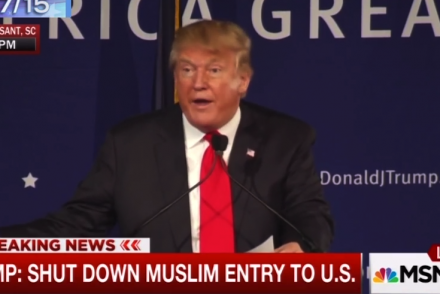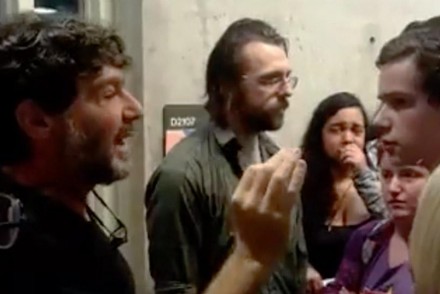Martin Luther King’s legacy is so all-encompassing and speaks to so many people that, like a great work of art, we all believe it speaks to us personally, and the things that we care about in particular. Today is a day when anybody with a certain perspective will claim King as their own, especially on the liberal side of the aisle, and perhaps most of all in the so-called “social justice” wing of that side. But while his roles as a fighter for racial justice, equality, and reconciliation are well known, there are additional roles he filled that have been almost totally forgotten – fearless free-speech advocate, blasphemer, and fact-based intellectual.
Just as Galileo’s scientific discoveries rankled the Church, racial equality and reconciliation were absolutely radical ideas for their time. In a space of white supremacy King was a blasphemer of the first order, his stance on free speech unequivocal and strong.
The soft-minded man always fears change. He feels security in the status quo, and he has an almost morbid fear of the new. For him, the greatest pain is the pain of a new idea.
Imagine this quote – taken out of the context of King’s cause and legacy – paired with some of the quotes from college students today.
“Bringing in a speaker like that could serve to invalidate people’s experiences…[it could be] damaging.”
At one point she went to the lecture hall — it was packed — but after a while, she had to return to the safe space. “I was feeling bombarded by a lot of viewpoints that really go against my dearly and closely held beliefs,” Ms. Hall said.
Especially imagine King’s thoughts on new ideas paired with a Yale student’s reaction to being forced to debate policies on offensive halloween costumes this past fall.
“I don’t want to debate. I want to talk about my pain.”
Is there any doubt how a King rising today would have been portrayed by the Social Justice Left, these “soft-minded” men and women? If this exchange at Yale is any indication, the reception would have been less than kind. We can see King in many ways being the antithesis of this modern movement with regards to tactics, which seems to favor ideology dictated by social force rather than the use of argument and reason to win the day. If the story of modern-day allies in the Social Justice movement tell us anything, it’s that King’s stance may not have been very welcomed, regardless of the agreement on desired outcomes and policy.
King re-articulated his commitment to the first amendment in his famous “Mountain top” speech, the last speech he gave before he was tragically assassinated on April 4, 1968. A court injunction had been issued against him to hold a rally and march on April 8, and in response he affirmed once again how un-American such an infringement on free speech really was.
Now about injunctions. We have an injunction and we’re going into court tomorrow morning to fight this illegal, unconstitutional injunction. All we say to America is to be true to what you said on paper. If I lived in China or even Russia, or any totalitarian country, maybe I could understand some of these illegal injunctions. Maybe I could understand the denial of certain basic First Amendment privileges, because they haven’t committed themselves to that over there. But somewhere I read of the freedom of assembly. Somewhere I read of the freedom of speech. Somewhere I read of the freedom of press. Somewhere I read that the greatness of America is the right to protest for right. And so just as I say we aren’t going to let any dogs or water hoses turn us around, we aren’t going to let any injunction turn us around.
Furthermore it is fascinating to compare what the Civil Rights activists went through in the 60s with the reception of some who breech the status quo today. When sit-in protestors sat at a Woolworth’s lunch counter in the 1960s…
Reactions to the sit-in protesters varied by restaurant. In many places, groups of white men gathered around the protesters to heckle them and there was occasional violence. “In a few cases the Negroes were elbowed, jostled and shoved. Itching powder was sprinkled on them and they were spattered with eggs,” The Times reported. “At Rock Hill, S.C., a Negro youth was knocked from a stool by a white beside whom he sat. A bottle of ammonia was hurled through the door of a drug store there. The fumes brought tears to the eyes of the demonstrators.” Many managers closed their counters rather than deal with the protests.
When one reads about a student earlier this year who published an Op-Ed in a publication at Weslyan University, critical of the tactics (but not the goals) of Black Lives Matter, the echoes of such behavior are inescapable.
Within 24 hours of publication, students were stealing and reportedly destroying newspapers around campus. In a school cafe, a student screamed at Stascavage through tears, declaring that he had “stripped all agency away from her, made her feel like not a human anymore,” Stascavage told me in a phone interview. Over the following days, he said, others muttered “racist” under their breath as he passed by.
Finally, on Sunday, the student government voted unanimously to halve funding for the newspaper and redistribute the savings among four campus publications (including, possibly, the Argus, subject to a student vote). This measure is allegedly intended to reduce paper waste and promote editorial diversity.
The irony is plain for all to see – how many of King’s self-proclaimed successors in this fight seem to abandon the very thing that made his fight possible? Among millenials and in the academy, where his ideas can be said to more or less be the majority consensus, there is an entirely different view on free speech. There are, it seems, certain taboos too sacred to be challenged.
This again, was not the case with King, even concerning questions of his faith. In a 1949 paper he wrote while at the Crozer Theological Seminary, King wrote about the similarities between Christianity and Mithraism, a Persian cult religion that was in competition with early Christianity. It is amazing to see the intellectual honesty with which he addresses the early history of Christianity, a kind of honesty that could cost a religious person socially even in today’s society.
“It is at this point that we are able to see why knowledge of these cults is important for any serious New Testament study. It is well-nigh impossible to grasp Christianity through and through without knowledge of these cults. That there were striking similarities between the developing church and these religions cannot be denied. Even Christian apologist had to admit that fact….One of the most interesting of these ancient cults was Mithraism, which bore so many points of resemblance to Christianity that it is a challenge to the modern student to investigate these likenesses and learn more about them….Ernest Renan, the French philosopher and Orientalist expressed the opinion that Mithraism would have been the religion of the modern world if anything had occured to halt or destroy the growth of Christianity in the early centuries of its existence. All this goes to show how important Mithraism was in ancient times.”
I can’t imagine any prominent Social Justice figures of today willing to be so honest about their own narratives. Too often we hear modern day Social Justice Warriors defending their ideology with every bit as much irrational war-like screeching with which the status quo of old defended their own. Martin Luther King was different – on the battlefield of ideas, he didn’t retreat into his safe space. Perhaps nobody pointed this out better than CNN’s Don Lemmon, speaking of the tendency of some to want to restrict speech during the widely covered Mizzou protests last year.
Freedom fighters like Dr. King and Malcolm X quite often and on purpose would run right into the lion’s den to engage with peopel with whom they didn’t necessarily agree or care for. Why? Because they weren’t afraid of confrontation. of being challenged. They weren’t afraid of being offended. They weren’t afraid of offending.
Students should be safe from physical harm, anywhere. But they should not be coddled by retreating into so called safe spaces for fear of having their feelings hurt.
The story of King’s quest to transform America’s moral compass follows an eerily similar arc to many other great reformers, particularly in the United States. There is no doubt that the reason the United States has endured, grown, and evolved for the better is due to its commitment in law to the Freedom of Speech. History has shown us that all progress is nothing more than peer-reviewed blasphemy, and for that reason we should honor MLK the blasphemer as much as in his other roles. Martin Luther King day should be a day to reflect on all that free speech has given us over time, including women’s suffrage, civil rights for minorities, and most recently, greater equality for LGBT citizens. The freer and more open the debate, the greater the progress. Perhaps nothing shows this correlation greater than the speed with which gay rights have progressed, thanks to the even freer flow of information made possible by the Internet and new technology.
Let us not dishonor King’s legacy by sacrificing the very principle that made his legacy possible. King was only successful because of his willingness to violate the ‘safe space’ of white America, a fact that should inspire us to rekindle our commitment to unsafe, intellectually fearless spaces. For it is at the frontiers of un-safe spaces that progress is found – it is only a matter of history finding the men and women brave enough to chart them for us.





No Comments